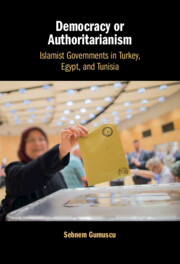Book contents
- Democracy or Authoritarianism
- Democracy or Authoritarianism
- Copyright page
- Contents
- Figures
- Acknowledgments
- Abbreviations
- Introduction
- 1 Modernization, Inclusion, and Power
- 2 A Theory of Intraparty Politics
- 3 The AKP’s Pivot from Liberal Democracy to Electoral Islamism
- 4 Electoral Islamism and Killing the Dream of a Democratic Muslim Brotherhood
- 5 Ennahda’s Path toward Liberal Islamism
- Conclusion
- Interviews
- Bibliography
- Index
Introduction
Published online by Cambridge University Press: 09 March 2023
- Democracy or Authoritarianism
- Democracy or Authoritarianism
- Copyright page
- Contents
- Figures
- Acknowledgments
- Abbreviations
- Introduction
- 1 Modernization, Inclusion, and Power
- 2 A Theory of Intraparty Politics
- 3 The AKP’s Pivot from Liberal Democracy to Electoral Islamism
- 4 Electoral Islamism and Killing the Dream of a Democratic Muslim Brotherhood
- 5 Ennahda’s Path toward Liberal Islamism
- Conclusion
- Interviews
- Bibliography
- Index
Summary
Three Islamist parties (AKP, Muslim Brotherhood, and Ennahda) won elections and came to power in three predominantly Muslim countries – Turkey, Egypt, and Tunisia – in recent decades. After coming to power, these parties followed different trajectories. Ennahda in Tunisia adhered to democratic principles, while the AKP and the Muslim Brotherhood did not. Why? Is Islamism (and Islam) at odds with democracy as skeptics claim? This chapter introduces the central questions of the book and three parties that comprise its subject. It shows that Islamist parties are not monoliths and are comprised of groups with different understandings of democracy. The chapter argues that Islamists often agree on the centrality of elections for ideological and strategic reasons, although they disagree on the norms underpinning electoral politics and what democracy means. It then identifies two main wings within mainstream Islamist parties: electoral Islamists, who carry majoritarian and exclusionary tendencies, and liberal Islamists, who commit to pluralist and inclusionary politics. The chapter concludes with a discussion on data and methods used in the study.
- Type
- Chapter
- Information
- Democracy or AuthoritarianismIslamist Governments in Turkey, Egypt, and Tunisia, pp. 1 - 22Publisher: Cambridge University PressPrint publication year: 2023



